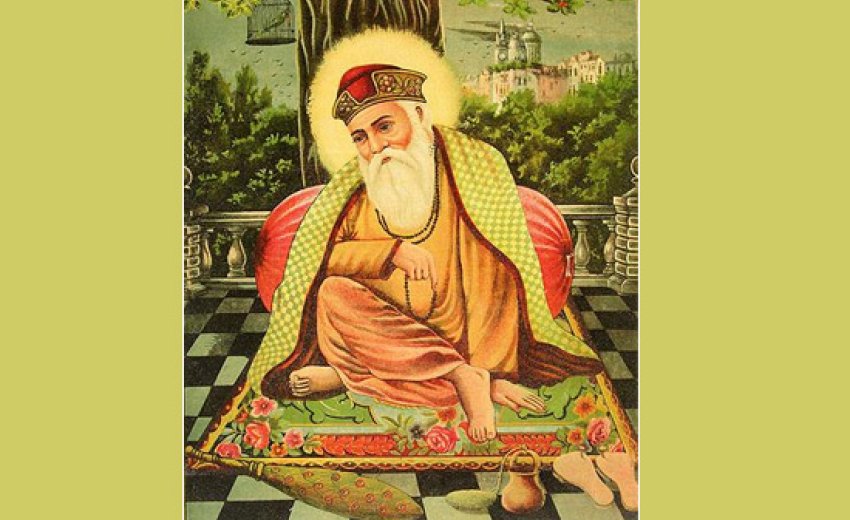In November, we celebrate the birthday of Shri Guru Nanak Devji (1469 – 1539 CE), known as his GURPURAB. This day is special for those who follow his teachings. We reflect on the words and life of the first Guru of Sikhs. Let's explore the key teachings of Guru Nanak Devji, particularly found in the famous Mool Mantar known as ‘Ik-Onkar’ from his composition "Japji Sahib".
A peek into Guru Ji’s life
In 1469, Guru Nanak Devji was born to Mehta Kalyan Das Bedi and Tripta Devi in the village of Talwandi, also called Nankana Sahib, near Lahore, which is now in Pakistan. The life of a Guru or Prophet is like a special gift to their followers. It's like a message that teaches important lessons. Guru Nanak Devji, the first Guru of the Sikh community, shared his wisdom, which later became a holy book known as the Shri Guru Granth Sahib.
Just like the teachings of other Prophets, Guru Nanak's words hold great significance for his followers. They see his teachings as timeless guidance for living a good life.
Writing about Guru Nanak Devji, Swami Vivekananda wrote: “Guru Nanak was born in the sacred land of India. He gave a message of love and peace of the whole world and preached the same through his teachings. He was full of affection for everyone and his arms were always outstretched as if to embrace the whole world...”
On a special day like Guru Nanak Devji's birth anniversary, it's important to reflect on his teachings rather than just celebrating his life. Guru Nanak Devji, the founder of the Sikh tradition, emphasized that connecting with God comes through the Guru's guidance and personal experience. He encouraged people to meditate on God's name (Naam) and to live with a deep awareness of God and a commitment to righteous actions.
To truly honour Guru Nanak Devji's legacy, we must take the time to understand and internalize his teachings. Simply reciting his words without comprehension misses the spiritual essence he intended to convey. It's not just about celebrating his birth; it's about embracing the wisdom he shared and applying it to our lives. Through sincere listening and contemplation, we can fully appreciate the blessings of his birth and the profound impact of his teachings on humanity.
The Shri Guru Granth Sahib, the holy book of Sikh followers, contains 5894 hymns. Among these, 976 hymns (about 17%) are written by Guru Nanak Devji, the first Sikh Guru. One of his most significant contributions is the "Japji Sahib," which holds a special place at the beginning of the Shri Guru Granth Sahib.
The "Japji Sahib" is recited daily by devout Sikhs and is seen as a condensed version of Guru Nanak's teachings. It includes the famous Mool Mantra, symbolized by 'Ik-Onkar', a fundamental symbol in Sikhism also seen on Gurdwaras, Sikh places of worship. The Mool Mantra, starting with 'Ik-Onkar', encapsulates essential truths and forms the core of Sikh beliefs.
In Eastern religious texts, there's a special concept called the "Mool mantra," which holds the core teachings of the entire scripture. To understand this concept, let's break down the term. "Mool" means 'root,' much like how a tree relies on its roots for sustenance and growth. Similarly, the "Mool mantra" is the fundamental mantra that encapsulates the essence of the entire scripture.
For Sikhs, their "Mool mantra" is found in the "Granth Sahib" and is expressed as "Ik-Onkar Sat-Naam Kartaa-Purakh Nirbhau Nirvair Akaal-Moorat Ajuni Saibangh Gurparsaad." This mantra serves as the foundation for the entire scripture. The "Japji Sahib" further explores and explains the Truth embedded in this mantra, and the entire "Granth Sahib" is an elaboration of the teachings found in "Japji Sahib." In essence, the "Mool mantra" is like the roots of a tree, providing the spiritual nourishment and foundation for the growth of the entire religious understanding.
The translation of the Mool Mantra ~ Ik-Onkar with the command ‘Jaap’ which means ‘chant and meditate’ is:
Ik Onkar: All is One
Sat Naam: This is our True Identity
Kartaa Purakh: Doer of everything
Nirbhau: Beyond fear
Nirvair: Beyond anger
Akaal Moorat: Beyond death
Ajuni: Unborn
Saibangh: Full of Light
Gurparsaad: This experience comes by Guru's grace.
Jaap: Chant
Aad Saach: Primal Truth
Jugaad Saach: True for all time
Haybee Sach: True at this instant
Nanak: O, Nanak
Hosee bee Saach: True forever
Numerous commentaries delve into the significance of each word in Guru Nanak Devji's Mool Mantra. Subsequently, in the Shri Guru Granth Sahib, the Mool Mantra is reaffirmed as the
ਅਉਖਧ ਮੰਤ੍ਰ ਮੂਲ ਮਨ ਏਕੈ ਮਨਿ ਬਿਸ੍ਵਾਸੁ ਪ੍ਰਭ ਧਾਰਿਆ ॥
Aoukhadhh Manthr Mool Man Eaekai Man Bisvaas Prabh Dhhaariaa ||
The Mul Mantra, the Root Mantra, is the only cure for the mind; I have installed faith in God in my mind.
Let's reflect on Guru Nanak Devji's teachings until we truly understand and feel their meaning in our lives.
*Based on an article by Ram Lingam, published in Indian Weekender on 9th November 2011
